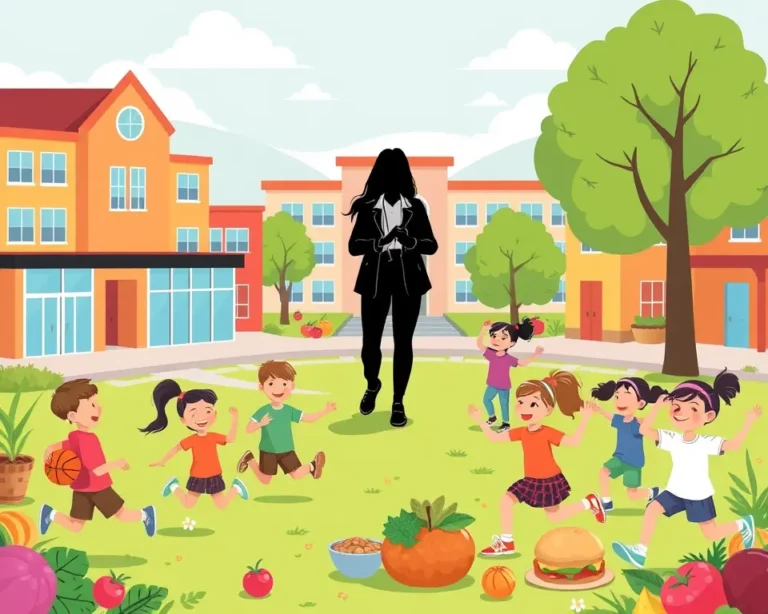U.S. Health and Human Services Secretary Robert F. Kennedy Jr. is recognizing a school in Gallup, New Mexico, for its outstanding commitment to physical fitness and nutrition programs. Hózhó Academy, a conservative charter school in Gallup, has been selected for this honor due to its unique approach to integrating health and wellness into the daily lives of its students. This recognition comes as part of Kennedy’s broader “Make America Healthy Again” (MAHA) initiative, which emphasizes preventive care and healthy lifestyles to combat chronic diseases.
Hózhó Academy: A Model for Health and Wellness
Hózhó Academy, serving students from pre-kindergarten through 11th grade, has distinguished itself through its dedication to both physical education and nutritious meal options. The school’s physical education program is modeled after the John F. Kennedy President’s Council on Physical Fitness, emphasizing active participation and achievement. The school also strives to offer nutritious meals for students, although some students have mixed opinions on the taste.
The school’s approach to physical fitness is outlined in a program manual on its website, suggesting that high rates of obesity and diabetes made Native Americans more susceptible to the COVID-19 virus. The academy is affiliated with the Hillsdale network of charter schools and flagship university, Hillsdale College, which emphasizes the “centrality of the Western tradition in the study of history, literature, philosophy and the fine arts.”
RFK Jr.’s MAHA Initiative
Secretary Kennedy’s visit to Gallup is part of a broader Southwest tour to promote his MAHA initiative. The MAHA plan promotes community-based initiatives to encourage healthy eating, regular exercise, and routine screenings, aiming to reduce chronic illnesses such as diabetes and heart disease. The initiative also focuses on vaccine transparency, environmental health, and integrative medicine.
MAHA supports rural healthcare through student loan forgiveness and telehealth investments, aiming to increase provider numbers in underserved areas. An executive order established the MAHA Commission to address chronic disease rates, particularly in children, and promote healthy lifestyles and better nutrition.
Key Components of MAHA:
- Preventive Care: Shifting the focus from disease management to disease prevention through community-based initiatives.
- Vaccine Transparency: Increasing funding for vaccine research while emphasizing informed consent and robust reporting systems for adverse events.
- Nutrition Reform: Eliminating processed foods from school lunches, banning certain food additives and chemicals, and updating nutrition guidelines.
- Rural Healthcare Support: Increasing the number of healthcare providers in underserved areas through student loan forgiveness and telehealth investments.
Details of the Visit
Principal Juliane Hillock sent a letter explaining how the visit came about. Heidi Overton, who works in President Donald Trump’s orbit as the deputy director of the White House Domestic Policy Council, made the connection between RFK Jr. and Hózhó Academy. Overton, who has ties to the Gallup area, was familiar with the school’s approach to nutrition and physical fitness and offered to facilitate the visit.
RFK Jr.’s visit to Gallup comes as at least one Indian Health Service building in the Navajo Nation border town is on a list of lease terminations proposed by the Department of Government Efficiency.
Broader Implications
Secretary Kennedy’s focus on nutrition and physical fitness in schools aligns with his broader goal of improving public health and reducing healthcare costs. By recognizing schools like Hózhó Academy, he hopes to inspire other institutions to adopt similar programs and create a culture of wellness among students.
Kennedy has long advocated for shifting the focus of healthcare from disease management to disease prevention. His MAHA plan promotes community-based initiatives to encourage healthy eating, regular exercise, and routine screenings, aiming to reduce chronic illnesses such as diabetes and heart disease.
Potential Changes Under RFK Jr.’s Leadership
- Nutrition Labeling Reform: More transparent labeling and increased FDA oversight over ultra-processed foods.
- Food Additive Restrictions: Tightening the standards for Generally Recognized as Safe (GRAS) substances and potentially banning more food additives.
- School Lunch Programs: Eliminating processed foods and focusing on healthier, more nutritious options.
Challenges and Controversies
While Secretary Kennedy’s vision for improving public health has garnered support, some of his views have also sparked controversy. His stance on vaccine safety, in particular, has been a subject of debate within the medical community. Additionally, his proposals to eliminate processed foods from school lunches may face challenges due to cost and logistical considerations.
Despite these challenges, Kennedy remains committed to his MAHA agenda and believes that a focus on prevention and healthy lifestyles is essential for improving the health of all Americans.
Gallup-McKinley County Schools
Gallup-McKinley County Schools (GMCS) is geographically the largest school district in New Mexico. All students receive free breakfast and lunch.
By the Numbers:
- 12,518: Students Enrolled
- 100%: Free Breakfast and Lunch for All Students
- 4,957: Square miles covered by the district
- #1: Average proficiency growth ranking
- 3,356: English-language learners
Conclusion
Secretary Kennedy’s recognition of Hózhó Academy highlights the importance of prioritizing health and wellness in schools. By showcasing successful programs and advocating for policy changes, he hopes to create a healthier future for all Americans, especially children. The visit to Gallup underscores the commitment to promoting nutrition and physical fitness as key components of a comprehensive approach to healthcare.







